All options remain for Confederate monuments after state bill dies in committee

An attempt to stop local governments from moving historic monuments and memorials off public land didn't come up for a final vote in this year's session of the Florida Legislature, leaving all options on the table for decisions about the fate of Confederate monuments that have polarized communities.
State Rep. Dean Black, R-Jacksonville, said he will bring the measure back up in the 2024 session.
"We're going to make some policy changes to it and some refinements," Black said. "It will definitely be refiled in the next upcoming session."
Cities and counties across Florida have been determining whether they will remove Confederate monuments from public spaces. In Jacksonville, Mayor Lenny Curry supports relocating the "Tribute to the Women of the Southern Confederacy" monument from Springfield Park. Curry ordered the removal of a Confederate soldier statue in 2020 from James Weldon Johnson Park in downtown.
Monument protest: Ben Frazier to pay $50 fine after police arrested him at Jacksonville City Council meeting
Waiting for decision: Jacksonville City Council says no to removing Confederate monuments, but it's not final vote
Party lines: Mayoral candidates' views on Confederate monuments split by Democrat and Republican
The bill sponsored by Black would have applied to all memorials and monuments dedicated to a "historic person, entity, event or series of events and which honors or recounts the military service of any past or present military personnel, or past and present public service" of a United States resident.
Black said Florida needs a state law because regardless of where a monument or memorial is located, it's part of Florida history, not just the history of a city or a county.
"If someone destroys historic monuments in one part of the state, all Floridians are diminished because of it," he told the House Constitutional Rights, Rule of Law and Government Operations Committee when it voted March 28 for the bill.
Opponents of Black's bill and similar legislation filed by state Sen. Jonathan Martin, R-Fort Myers, said the state should not tie the hands of local leaders.
Critics also objected to a provision that would have let anyone in the state have standing to sue in state court over any unauthorized removal of a monument from public land.
"This is a real serious issue in Jacksonville, and we need to be able to solve this ourselves without the state telling us what to do and the threat of lawsuits," state Sen. Tracie Davis, D-Jacksonville, said in March when she voted in March against a version the Senate version of the bill in committee.
Jacksonville still must decide on Confederate monument
While the legislative session drew to a close Friday in Tallahassee, the debate about the future of the Confederate monument in Springfield Park could be coming to a head in Jacksonville City Council over the next couple of months.
The large granite monument, which has stood in the park since 1915, houses a bronze statue of a woman reading to two children and has a second statue on the roof of a robe-draped woman holding a Confederate flag.
Curry proposed $500,000 for removing the monument from Springfield Park when he unveiled his budget last summer. City Council agreed to keep the money when it approved the 2022-23 budget, which runs through the end of September, but changed the line item to say the options also will include leaving the monument where it is or renaming it.
City Council President Terrance Freeman said in March he wanted to first resolve a federal lawsuit that challenged the city's redistricting map before taking up the Confederate monument. Council is set to vote Tuesday on a settlement of that lawsuit.
A new council president will take over on July 1 when the spring elections also will bring turnover in the City Council roster and a new mayor. Freeman said he will work on council reaching a decision while he is council president.

"I'm waiting for the redistricting process to be done, but I'm committed to addressing that issue and council will do it during my term," he said.
The Southern Poverty Law Center, which supports removing Confederate monuments from public space, said in April that 482 Confederate symbols have been removed, renamed or relocated since June 2015 in all states.
The organization says about 2,600 Confederate symbols are still in public places, and seven states across the South have laws to block the removal of Confederate memorials. Florida would have become the eighth state, according to the Southern Poverty Law Center.
The House and Senate had different version of the monument protection legislation this session.
In the House, Black won support for an amendment that said a "governmental agency" could only relocate a monument or memorial if that were necessary for construction of publicly-owned buildings or transportation projects.
The Senate version of the bill said relocation could not be done without the "authorization of the owner" but did not limit that authority just to cases for a public building or transportation project.
Black said his bill would not prevent the addition of historical monuments and memorials that tell more parts of the state's history.
"We should not destroy our history," he said. "Neither should we prohibit anyone from telling their story. So don't tear down my history. Tell yours."
Davis said she expects the Legislature will see the bill come back again "but I'm always grateful to see local governments remain in control of their own issues."
She said the Confederate monument in Jacksonville causes a "tremendous amount of concern and anxiety for many of our residents."
"Removing the monument does not mean erasing history," she said. "It means we do not honor it, and my constituents have told me that removing the monument is the right move for Jacksonville now."
This article originally appeared on Florida Times-Union: Florida won't prevent cities from removing Confederate monuments

